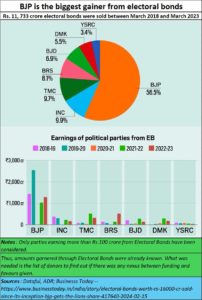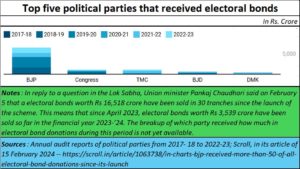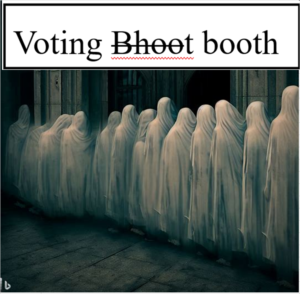Wrecking is easier than creating
RN Bhaskar
The Bing generated image shows a Samson-like figure wrecking buildings. Some people can be seen clapping in adulation. Others are fearful. The recent move by the venerable State Bank of India (SBI) seeking more time from the country’s apex court for disclosing the names and details of Electoral Bonds suggests how the last man standing in the financial sector in India is also being knocked down.
It may be recalled that, on February 14, 2024, a five-judge bench of the Supreme Court of India struck down the Centre’s Electoral Bond scheme — which facilitates anonymous political donations – as being unconstitutional. It underscored that the scheme violates the right to information under Article 19(1)(a) of the Constitution (https://www.scobserver.in/reports/electoral-bonds-constitution-bench-judgement-summary/).
Directions
The Apex court also issued the following directions:
- The SBI shall stop issuing Electoral Bonds
- SBI shall submit details of the Electoral Bonds purchased from 12 April 2019 till date, to the Election Commission of India (ECI). The details shall include the date of purchase of each Bond, the name of the purchaser and the denomination of the Bond purchased.
- SBI shall submit the details of political parties which have received contributions through Electoral Bonds since 12 April 2019 to date to the ECI. This must include details of each Electoral Bond encashed by political parties, the date of encashment and the denomination of the Electoral Bond.
- SBI shall submit the above information to the ECI within three weeks from the date of this judgement (by 6 March 2024).
- The ECI shall publish the information shared by SBI on its official website within one week from the receipt of the information (by 13 March 2024).
- Electoral bonds which are within the validity period of 15 days but have not yet been encashed by political parties shall be returned by the party and refunded to the purchaser’s account.
 SBI wilted, possibly in contempt
SBI wilted, possibly in contempt
Curiously, the State Bank of India, on 4 March 2024, asked the Supreme Court for more time till June 6, for disclosing the details sought (https://thewire.in/government/state-bank-of-india-extra-time-june-30-electoral-bonds-supreme-court). The request had two terrifying implications. First, the SBI was trying to skirt the Supreme Court Order, thus exposing itself to charges of contempt. Second, the date sought was – in all probability – after the general elections would have been over. By that time, the Electoral Bonds issue would have become infructuous because what was deemed unconstitutional would continue to benefit political parties and the donors who have supported the parties with their funds.
Not surprisingly, the Association for Democratic Reforms (ADR) filed a contempt petition against the SBI and other parties (https://main.sci.gov.in/supremecourt/2017/27935/27935_2017_1_1501_50573_Judgement_15-Feb-2024.pdf). The application stated that the SBI “has deliberately filed” the application on March 4, 2024, “at the last moment in order to ensure that the details of donors and the amount of donations are not disclosed to the public before the upcoming Lok Sabha elections” and that it “neither discloses the progress made so far & steps taken to comply with the judgment…nor it shows even part-compliance of the judgment…”.
In an equally damning indictment, Thomas Franco, former general secretary of the All-India Bank Officers’ Confederation or AIBOC (https://www.youtube.com/watch?v=47iXqk4p2Fk) spoke with The News Minute. He explained why the SBI was lying. That the bank has been making such disclosures all along to the Finance Ministry. That it had all the information, but still did not want to comply with the directions of the apex court.
Even more damning was a statement from Subhash Chandra Garg, former Finance Secretary, under the present government (https://www.youtube.com/watch?v=oz2YzoIkD4A). He say at timeline 0:16 “all it requires is . . . to go to their bank account and sort on the date when the bond was purchased and compile that information. . . that shouldn’t take any time.” He also says (2:46) how the “Supreme Court had earlier asked for the same information in the interim order in 2019 and the SBI had supplied that information though it was supplied in a sealed cover. Art that time they had not asked for any time . . . there appears to be an attempt to confuse the issue.”
The ability of the SBI to pass on this information regularly to the Finance ministry is brought out quite succinctly through documents by The Reporters Collective (https://www.reporters-collective.in/blog/sbi-electoral-bonds-data).
Clearly, the SBI was under immense pressure from the government not to disclose the details. He recalled the way former heads of the SBI have stood up to government pressure and mentioned how Raj Kumar Talwar (1922–2002) who served as chairman of the SBI preferred to stand up against government instructions, and was eventually sacked by the Indira Gandhi government in the emergency in 1976 for refusing to grant loans to people favoured by the government (https://en.wikipedia.org/wiki/Raj_Kumar_Talwar).
This is evident from the way SBI’s web managers were asked to delete all information relating to Electoral Bonds from its website (https://twitter.com/thewire_in/status/1765786281936642458?cxt=HBwWtIa7wZLRqoExAAAA&cn=ZmxleGlibGVfcmVjcw%3D%3D&refsrc=email).
Ironically, and sadly, even the website of the ECI does not make any mention of the Supreme Court verdict (https://www.eci.gov.in/issue-details-page/press-releases). The ECI is a Constitutional Body, whose loyalty should be to the Constitution and not the government. When the Supreme Court had declared the scheme “unconstitutional,” this ought to have been mentioned on the ECI’s website.
Clearly two venerable institutions were on the verge of being toppled and wrecked.
The government has maintained a studied silence on this issue. Presumably, it is letting the SBI and the ECI to work out ways to wriggle out of this mess.
But the government has been guilty of other highly questionable moves earlier as well.
- Consider the manner in which it modified the Prevention of Corruption Act in 2018 (https://asiaconverge.com/2018/08/amendments-to-prevention-of-corruption-act-protect-corruption/ and https://www.moneycontrol.com/news/india/opinion-why-corrupt-politicians-and-bureaucrats-can-now-breathe-easy-2822671.html). It amended the laws in such a way that any complaint against corruption would become difficult. Then the reduced number of complaints would allow the government to claim that it had actually reduced corruption. The amendments are being challenged in the courts.
- Also consider the way the Foreign Contributions Regulations Act was modified to permit political parties to get money from overseas without any questions being asked. This was done possibly to sidestep an earlier ruling by the Courts against such a move (https://asiaconverge.com/2018/08/amendments-to-prevention-of-corruption-act-protect-corruption/). Even this is being challenged in Indian courts.
- Then consider the way the government tried to make the Aadhaar card the cornerstone for all identification, despite court strictures. This was even though nine states had more Aadhaar cards than the populations in these states (https://bhaskarr.substack.com/p/indias-election-peril-aadhaar-and?sd=pf). It is only in January 2024, that the EPFO (Employees Provident Fund Organisation) declared that it would refuse to use Aadhaar cards as a proof of birth date (https://economictimes.indiatimes.com/wealth/save/epfo-removes-aadhaar-from-list-of-acceptable-proof-for-updation/correction-of-date-for-birth-check-details/articleshow/106917395.cms?from=mdr).
- The danger of bogus Aadhaar cards could be a threat to the integrity of elections in 2024 was an issue that former secretary to the Government of India, EAS Sarma, had flagged in April 2023. He shot off a letter to the ECI (https://countercurrents.org/2023/04/proliferation-of-fake-aadhaar-cards-a-threat-to-integrity-of-2024-elections/), which evidently chose not to look into this issue.
- The refusal to hold the Census in 2021 is another rankling issue which affects any sensible analysis of the population and hence the economy and even the elections (https://bhaskarr.substack.com/p/ghosts-at-the-voting-booth?sd=pf).
Conclusion
One way or the other, all the instances listed above have a bearing on the 2024 elections. That is why the Electoral Bonds issue could become a major milestone on the way India conducts both its law making and its elections.
- The SBI has inadvertently become another institution to be in danger of being wrecked. One just hopes and prays that this does not happen.
- The judiciary is under attack. Judges have been inducted into sinecures – into the Rajya Sabha too (https://indianexpress.com/article/political-pulse/cji-gogoi-rajya-sabha-zero-questions-no-private-member-bill-poor-attendance-8445237/).
- The ECI, as mentioned above, has become almost partisan.
- The investigative machinery, especially the CBI and the Enforcement Directorate have been “weaponised against businesses and opposition leaders – as stated by Ruchir Sharma recently (https://www.youtube.com/watch?v=EhFqKSolFMs at 25:41).
With institutions under attack, India’s very future as a democracy could also be under attack.







































COMMENTS